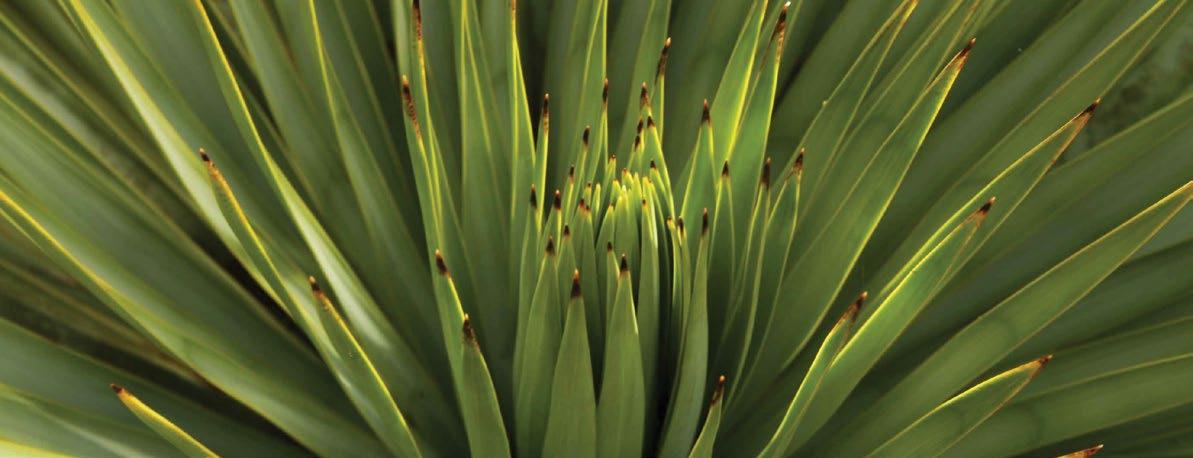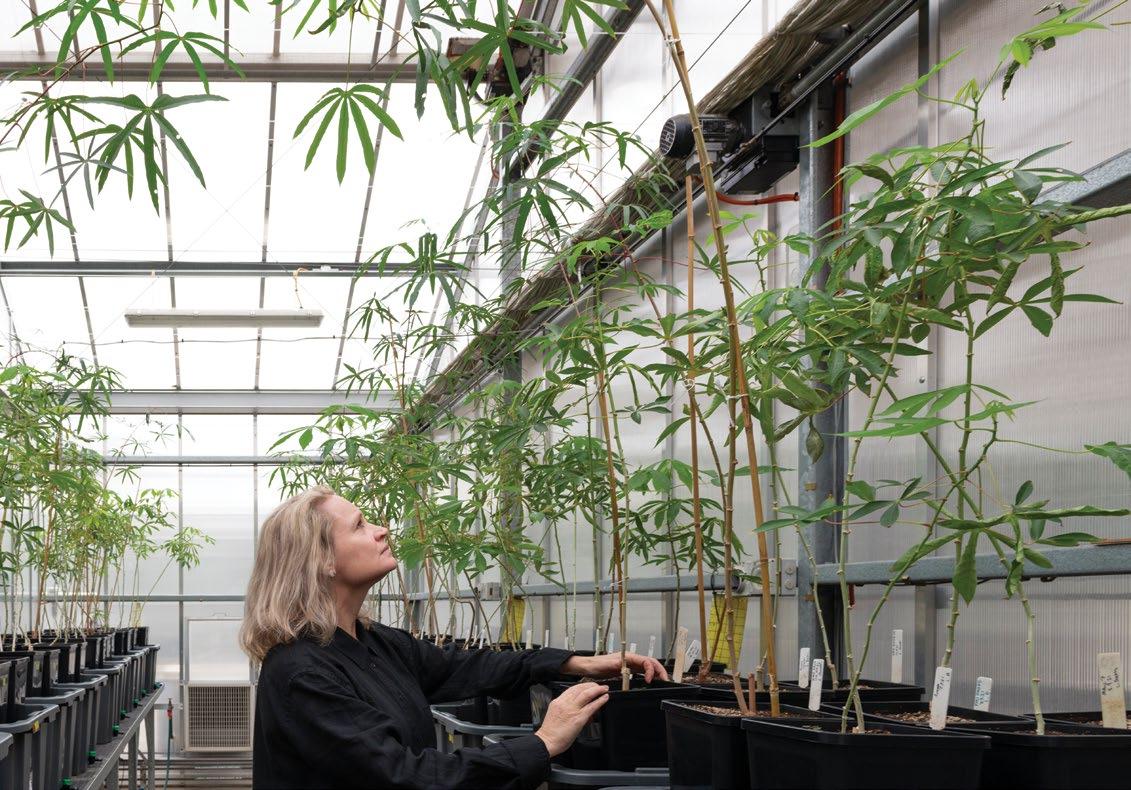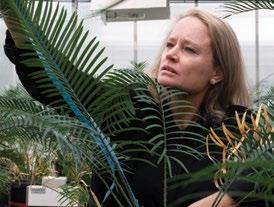
5 minute read
Plant Sciences
MAJORS IN THE SCHOOL OF BIOLOGICAL SCIENCES PLANT SCIENCES
Why is plant sciences such an exciting area of science?
Advertisement
The two big challenges facing the world today are climate change and population growth. Feeding the world while preserving biodiversity is a major focus of plant science research. In the plant sciences major, you will study the diversity and function of plants and their interactions with the environment. For example, how do plants obtain their water and nutrients from the soil and how does photosynthesis use light energy to transform carbon dioxide into carbohydrates? How do bushfires affect vegetation structure? How does climate change affect food security? You can investigate these issues either at the level of the ecosystem, the whole plant, or at a cellular and genetic level.
MAJOR RESEARCH AREAS IN PLANT SCIENCES
Monash has a strong research program in a broad range of plant sciences.
Plant ecology and evolution affects natural ecosystems and food security
We study the ecology and evolution of reproduction in plants to understand how they allocate their energy resources. For example, plants need to interact with pollinators in order to produce the next generation, and this interaction with pollinators has led to the evolution of complex and beautiful floral patterns and reproductive strategies. Our work seeks to understand plants in the natural environment. This information also has strong economic and practical applications. Plant-pollinator interactions are central to maintaining agricultural crop production. The genetic forces governing the evolution of plant species also helps us to understand, predict and control invasive plants.
Plant responses to global climate change
We study the effect of climate change on plants and consequences for global food security. Rising levels of atmospheric carbon dioxide and increases in global average temperatures affect plants directly through the process of photosynthesis as well as by changing the climate. When CO2 is higher, plants are more efficient, so they downsize their photosynthetic apparatus, which is mostly made of protein. Under future climate change projections, plants are therefore predicted to evolve to be less nutritious with lower concentrations of protein and micronutrients. Growing world populations, coupled with the predicted negative impacts of increasing temperatures on agricultural productivity, presents a significant challenge to global food security. We are using diverse approaches to address this challenge using a combination of cutting edge agritech, biotech and genomic approaches.
Plants are the basis of life
Plants and algae are the dominant forms of life on Earth, forming the basis of all food chains and thus underpinning all forms of life on the planet. The oxygen we breathe and the food that animals depend on all starts with plants. How do plants allocate their energy resources between reproduction and other functions like growth, stress tolerance and defence against herbivores? Understanding how plants trap energy, grow, develop and set seed is fundamental to what we do in the Plant Sciences. Plants can’t run away; instead, they produce chemical and physical defences to protect themselves from herbivores. A focus of our research is on the toxins that all plants make naturally, and how this affects the animals that eat them. We are also using genetic technologies to develop non toxic varieties of crop plants that are safe for human consumption.
Can plants contribute to a sustainable future?
Our research works towards many of the United Nations Sustainable Development Goals. We study the interactions of plants with nutrients, invertebrates and microbes in the soil. The big question is: can we manage these interactions to achieve environmental sustainability in a time of significant environmental change? We use cutting edge technologies to address the problems at different scales, from the molecular level through to the scale of whole landscapes. This scientific understanding ultimately needs to inform policy, and we believe in applying our research findings to issues of national and international significance.
PLANT SCIENCES IS THE SCIENTIFIC STUDY OF PLANT DIVERSITY AND FUNCTION AND THE ROLES THAT PLANTS PLAY IN DIFFERENT TYPES OF ECOSYSTEMS.
First year
Major
BIO1011 and one of BIO1022 or BIO1042
Second year
BIO2181, BIO2030 and BIO2010
12 points
Minor
18 points
BIO1011 and one of BIO1022 or BIO1042 BIO2181 and BIO2030 12 points 12 points
Third year Total Points
BIO3091 and BIO3082 and any other Level 3 BIO or GEN Units. 18 points 48
24
PLANT SCIENCES ACADEMIC ADVISOR & COORDINATOR: PROFESSOR SURESHKUMAR BALASUBRAMANIAN
Plant sciences is the study of plants, their diversity and structure, and how they function. It involves studying plants living on land, in the sea and in freshwater environments, from the scale of genes and molecules to ecosystems and landscapes. We study the great diversity of plant groups, from algae and mosses through to gymnosperms and angiosperms. We investigate how plants function, have evolved and are adapted to particular environments, and the distribution and diversity of plant species and the plant communities in which they grow.
LEE O’SHEA


Bachelor of Science (Honours) Major: Double in Plant Sciences and Ecology and Conservation Biology Minor: Zoology Lee is currently studying the Bachelor of Science (Honours) after completing a double major in Plant Sciences & Ecology and Conservation Biology, with a minor in Zoology. She is currently working with internationally esteemed researchers exploring the impact of environmental change on the southern brown tree frog. Remarkably this is the only known southern hemisphere frog that tolerates being completely frozen! Lee is investigating the minimum temperature at which the tree frogs remain active, to inform a model of its potential distribution. As part of her undergraduate Biology in Action Research unit, Lee has also worked with plant researchers to examine a highly toxic cycad species that is a culturally significant food source for Indigenous people. Lee examined the defence mechanisms of the cycad, and the specialised root system grown to accommodate the symbiotic cyanobacteria. After completing her studies, Lee would like to embark on further conservation focused research.
I have participated in several science and conservation projects including field surveys, environmental sampling and getting primary school children interested in science and nature. It’s very satisfying watching children get excited about science and understanding that science is fun.”










